100 Film Favorites – #24: Chitty Chitty Bang Bang
(Ken Hughes, 1968)
Today’s film stars Dick Van Dyke and features songs written by the Sherman Brothers, but it’s not Mary Poppins. It was adapted from a novel by Ian Fleming and produced by Albert R. Broccoli, but it’s not a James Bond movie. It’s Chitty Chitty Bang Bang, and like Doctor Dolittle, it’s among the redheaded stepchildren of the 1960s family musical movement.
In the film, Van Dyke plays Caractacus Potts, an eccentric inventor and single father living in the nineteen-teens. Potts is absentminded and poor, but dotes on his children, Jeremy and Jemima (as well as his own father, a half-senile old man who fancies himself an explorer). The kids enjoy playing in a wrecked racecar in town, and beg their father to purchase the car, to save it from being dismantled for scrap by a “mean old junk man.” Unfortunately, Caractacus lacks the money.
Days later, Caractacus looks over his myriad inventions, many of which resemble modern technologies, including television (“transmitting pictures by radio”) and the vacuum cleaner (“cleaning carpets via suction”). He regards the gadgets critically, disappointed that, despite his mechanical ingenuity, he has been unable to provide a better life for his children. Potts is particularly frustrated by a candy-making machine which produces candies riddled with holes. His frustration turns to delight, however, when he discovers that blowing through the cylindrical candies produces a flute-like whistling sound, the pitch of which can be modified by covering or uncovering the various holes. In hopes of finally making some money, Potts takes his “Toot Sweets” to the headquarters of Scrumptious Confectionary, a large candy company based nearby.
After an unsuccessful pitch to a bored Lord Scrumptious, Potts is encouraged by Scrumptious’ daughter, Truly, to make a more aggressive attempt. Her support surprises Potts, as the upper-class Truly had previously chastised him for allowing his children to play hooky (or, since they’re British and old-timey, “play truant”) from school. However, she is impressed he has devised an invention that “actually works,” and joins him in an impassioned second pitch that grows into a sweeping musical number extolling the many virtues of Potts’ whistling candies, which offer “the toot of a flute with the flavor of fruit.” A note to creative types hoping to have projects greenlit: If hearing your pitch causes the entire company to spontaneously break into song and dance, you’re on the right track.
But things go awry when the city’s dogs, agitated by the constant whistling, burst onto the factory floor, contaminating the candy. The workers angrily shoo Potts away.
Caractacus’ next get-rich-quick scheme involves taking his “automatic hair-cutting machine” to the fair. When the device leaves its first customer looking like a Norfin troll, Potts flees into an adjacent tent, where he suddenly finds himself part of a musical performance. In true musical fashion, he instantly catches on to the song and dance around him, and the show is a great success. Potts finally has enough money to buy the junked car.
He spends the following weeks cooped up in his garage, tinkering with the car (and incorporating some unconventional parts, including a fireplace hood and a rowboat). Finally, he emerges, with the car as good as new…and better.
Caractacus invites Truly to join him and his family on a picnic outing to the beach. They ride there in the car, newly christened Chitty Chitty Bang Bang after the sound made by its engine.
After a happy afternoon of seaside bonding, Jeremy and Jemima implore their father to tell a story…an exciting one!…with pirates! Potts begins his “tale” by announcing that the car he has built contains many innovative features and components, which foreign powers are eager to steal. In particular, one Baron Bomburst of “Vulgaria” has his sights set on purloining the “magic car.”
At Potts’ description, Bomburst and his crew appear on the horizon in a mighty sailing ship. The Baron closes in on Chitty, which has become stranded by the rising tide. Suddenly, the car’s tires fold out, and a large raft inflates from the underside of the car. Chitty and the Pottses repeatedly evade capture as they zip across the water, eventually even taking to the sky when the car sprouts wings and a propeller.
Unable to capture the car, Bomburst opts to kidnap the inventor. He sends a pair of bumbling spies ashore to kidnap “Mr. Potts,” and they inadvertently return with the wrong one, having abducted the elderly grandfather. Bomburst nonetheless confines his captive in a dungeon “laboratory” filled with other failed scientists, and orders Grandpa Potts to recreate “his” wondrous flying car.
To rescue Grandpa, Caractacus, Truly, and the children must fly to Vulgaria. They are shocked to find the entire country devoid of children, as the Baroness Bomburst has outlawed them. Any child seen in public is rounded up by the “Child-Catcher,” easily one of the creepiest characters in the history of “family film.” The family seeks asylum in the workshop of a Vulgarian toymaker (Benny Hill), who now makes toys only for the Baron himself. One morning, while Caractacus and Truly go out in search of food, the Child-Catcher lures Jeremy and Jemima from the shop with promises of “lollipops…ice cream…and all…free…today…”, and when they inevitably emerge he traps them gleefully in a cage.
With the toymaker’s aid, Caractacus and Truly infiltrate the Baron’s birthday celebration by posing as life-sized dolls, presents for Bomburst. They reveal their ruse while dancing with the “birthday boy” – Caractacus ties the Baron up, and a crowd of local children, who had been living in the sewers, swarm into the party and overpower the Vulgarian nobility, even ensnaring the Child-Catcher in his own net. The victorious army of kids quickly rescue their fellow children, including Jeremy and Jemima, from the dungeons. Reunited with grandpa and the children, Caractacus and Truly soar away triumphantly in Chitty Chitty Bang Bang.
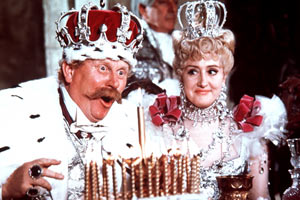
First Nedry, now Bomburst. Why do all these protagonists keep ruining things for such jolly, genial “villains”?
“And then they got married!” shout the children, concluding the story that their father has apparently been telling the entire time. Caractacus is embarrassed by their suggestion, as he and Truly are of vastly different classes. But through the magic of plot convenience, the family returns home to find Lord Scrumptious bro-ing out with Grandfather Potts (apparently the two are old war buddies). Scrumptious has even better news: He has decided to re-brand Toot Sweets as Canine Candies, the first confections made specifically for dogs. The venture, he says, will make Caractacus rich.
Potts races to tell Truly the good news, and they embrace. As they putt off down the road in Chitty, Truly observes that now Caractacus will finally have the funds to finish some of his other inventions. But Potts says he will need to be more serious from now on, and “keep his head out of the clouds.” Ironically, Chitty Chitty Bang Bang is already soaring high above the ground.
Many critics have written off Chitty Chitty Bang Bang as innocuous and “forgettable.” However, the film has certainly stuck with me. It’s full of vibrant color (which really pops on the recent blu-ray release), and, like Labyrinth, creates a sense in the viewer than the fantastic truly is possible. The songs are as infectious and well-crafted as any in the Sherman brothers’ oeuvre. Particular standouts are “Posh,” sung by the abducted grandfather as he describes his (imagined) life as a world-traveler, “The Roses of Success,” a rousing song in which the incarcerated scientists explain that one must always keep trying when faced with failure, and “Hushabye Mountain,” a haunting lullaby Caractacus sings to his children.
The biggest problem I see with the film is the odd structure of the narrative. The “story within a story” about Vulgaria begins approximately halfway through the film. Most films which feature a fantastic dream sequence / tall tale / whatever the Bomburst story is supposed to be (say, The Wizard of Oz, Labyrinth, or The 5,000 Fingers of Dr. T) have the protagonist thrust into the fantasy realm early in the film’s first act, and most of the film’s actual story takes place within that fantasy. In “Chitty,” the “story” seems thrown in haphazardly at an awkward time. The sequence doesn’t actually influence the primary conflict of the film’s main storyline (i.e., that Caractacus yearns to create a successful invention so as to earn money and provide for his children). Annoyingly, we don’t even know for certain whether what happens with Bomburst is really only a story, as the car apparently can actually fly at the end of the film. That kind of a twist/reverse twist stinger works okay at the end of Michael Jacksons’ ‘Thriller’, but in this context it’s just confusing. Worst of all…the Bomburst story is the most exciting, impressive part of the film. Naval and aerial battles, the Child-Catcher, the science dungeon, a bizarre scene in which the Baron attempts to “accidentally” murder his wife – the most memorable moments in the film are all part of an arc which may or may not be real and which turns out to have no significance within the larger story.
Even with this confusion, though, Chitty Chitty Bang Bang is an entertaining film. I highly recommend checking out the blu-ray, which, in addition to making the film look great, is packed with quality bonus material. Included are a production recording of the Sherman Brothers performing the score live, and a vignette on the “kinetic artist” responsible for designing Potts’ quirky, steampunk-ish inventions.
Tidbits:
–Chitty Chitty Bang Bang has been referenced extensively on Family Guy, with two of the film’s songs being parodied on the show virtually in their entirety. “I Have You Two” became “I Have James Woods,” and “Me Ol’ Bamboo” was turned into “A Bag of Weed,” keeping the original xylophone solo intact. I’m going to go out on a limb and say Seth MacFarlane is a fan.
-Other Chitty songs have subsequently popped up elsewhere as well. In a peculiar moment, Tom Cruise sings “Hushabye Mountain” to comfort his daughter while roving martians destroy the city in the 2004 War of the Worlds adaptation.
-In addition to the original book being written by Ian Fleming, and the film produced by Albert R. Broccoli, the James Bond / Chitty connection goes even deeper. Baron Bomburst is played by Gert Frobe…who had earlier portrayed the titular villain in Goldfinger.
-Lionel Jeffries, who plays Grandfather Potts, was actually six months YOUNGER than his “son” Dick Van Dyke!
-Finally, enjoy this stirring rendition of the title tune by the Low Brass section of the Thomas Jefferson Marching Band, from their 2007 album Zebroid.
—
Brian Terrill is the host of television show Count Gauntly’s Horrors from the Public Domain. You can keep up with Brian’s 100 Film Favorites countdown here.


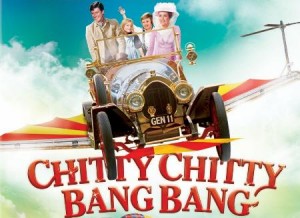
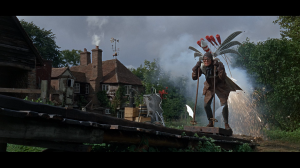
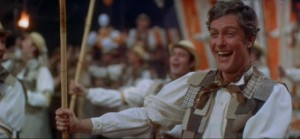
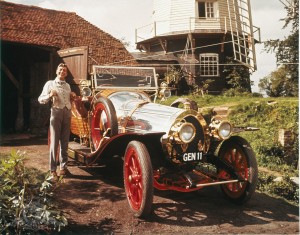
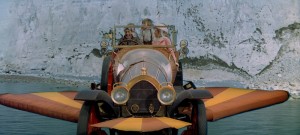
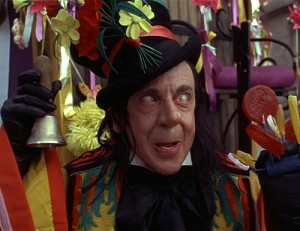
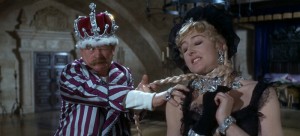
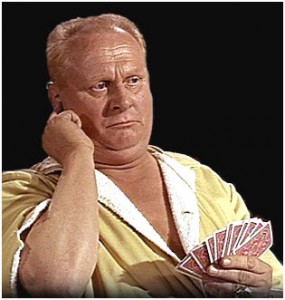



I could never understand why the Baron wanted his wife dead. Sure from the kids perspective she was a horrible women, but from her husband’s she should have been a dream come true. She loved him, bought him all his fav toys, cared deeply for him and dressed in the hottest outfits, not forgetting how curvy she was was in them. Man I would have been very happy with this women. Of course there is also the oddness of having this whole “Kill you wife while wearing a corset idea” IN A KIDS MOVIE!!! must have been some good drugs on set 🙂